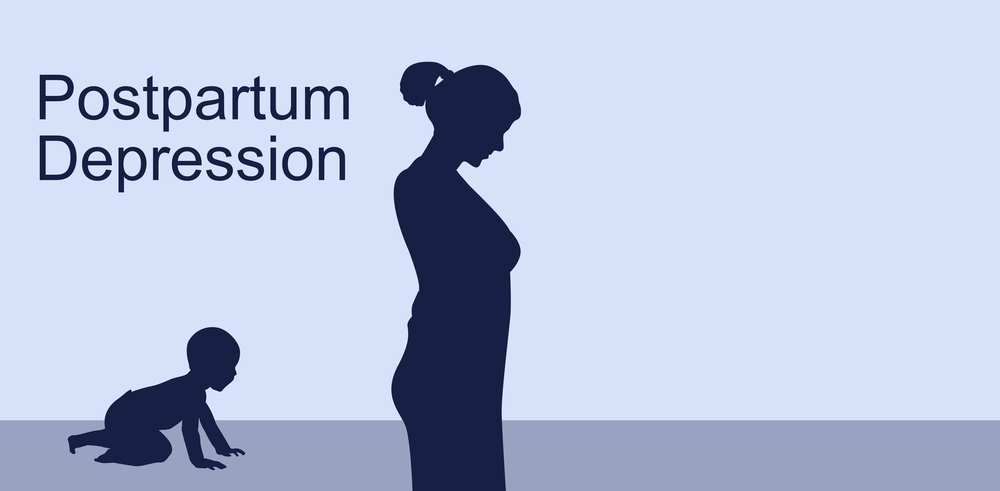Postpartum depression affects about 15% of women. Which is about 1 in every 7 women have some form of postpartum depression. Postpartum depression usually occurs within 3 months of giving birth. Postpartum depression is different then just the normal baby blues that some women experience the first two weeks after giving birth.
Postpartum depression lasts longer, symptoms don’t ease, and left untreated can last up to three years after giving birth. Baby blues occurs in the first two weeks after giving birth where the mother feels sad, tired, fatigued, and flat. These symptoms usually fade after the second week. Women sometimes don’t recognize the signs and symptoms of postpartum depression.
Causes
Lots of things can cause postpartum depression. It doesn’t just affect women. Postpartum depression can affect fathers as well. It can also affect women who have miscarriages or have an abortion. Postpartum depression can also affect families that adopt.
Biological changes, extreme stress, or major life changes can all play into someone developing postpartum depression. Examples are not getting enough sleep, body’s hormones fluctuating, physical recovery of the birth if surgical intervention was needed, birth plan not going as planned, new and challenging responsibilities as a new parent, or feeling isolated, lonely, or confused.
Risk Factors
First time mothers, young mothers, or mothers of twins have a higher risk of having postpartum depression. Having a history of anxiety and depression, negative attitude toward pregnancy, history of sex abuse, low self-esteem, or history of insomnia can also be a factor.
Diagnosis
Pediatricians are taught to screen mothers at their baby’s well check visits for the first year to check for signs of postpartum depression. Since postpartum depression can look different to every woman. It can also affect the same woman differently with each pregnancy.
Symptoms
Symptoms of postpartum depression are all day everyday, and usually start to disrupt daily routines. Not everyone with postpartum depression will present the same symptoms.
Symptoms can include depressed mood, severe mood swings, and excessive crying. Difficulty bonding with the baby. Difficulty concentrating. Withdrawing from friends and family. Loss of appetite, or eating more than usual, weight gain or loss. Insomnia and overwhelming fatigue. Hopelessness, restlessness, feelings of worthlessness, shame, or guilt. Severe anxiety or panic attacks. Thoughts of harming yourself or your baby, thoughts of suicide.
These symptoms usually present themselves within a few weeks of birth. Though some people may not show symptoms until up to a year after giving birth.
Complications
When postpartum depression is left untreated it can last up to three years after giving birth if not more. 5% of women who in one study that were left untreated for postpartum depression still showed symptoms at 3 years past giving birth.
Other factors can cause your postpartum depression to last longer. If you have a history of a mental condition or depression. If you suffer from breastfeeding difficulties. If your delivery was complicated or didn’t go as planned. People who lack a support system of family and friends also have a higher risk of postpartum depression lasting longer.
During your postpartum time period if you have other major life changes such as a big move, or loss of employment, it can also affect how long your postpartum depression lasts. Having a history of postpartum depression.
Treatment
Treatment is available for postpartum depression. Treatment depends on the symptoms, severity, and what the patient is willing to do. Treatment can include taking antidepressants. Most of these will cause you to not be able to breastfeed your baby. Counseling will be recommended.
Cognitive behavioral therapy is one the main ways that depression is treated. Group therapy with other mothers can also help. Having help at home can also help ease symptoms. Getting enough sleep, eating healthy, and getting regular exercise can also help balance your mood and body.
Postpartum depression usually goes away within 6 months, especially when treated quickly. In some cases postpartum depression can last for months or years with treatment. When left untreated it can last up to three years after giving birth. Postpartum depression is not inclusive to just mothers who give birth.
Postpartum means going back to being not pregnant. So postpartum depression can affect someone who has suffered a miscarriage, or an abortion. It can also affect fathers and families who adopt as well. Recognizing the signs and symptoms is important to getting treatment. The main things to notice are lack of interest, irritability, fatigue, and sleep problems. You can contact your OB doctor who will be able to help you.
Having trouble sleeping? Apothe-Cherry contains a wide variety of unique antioxidants and phytochemicals that help balance circadian rhythms promoting a deep and restful night’s sleep!
1 in every 7 women have some form of postpartum depression! Know the signs. #HealthSurgeon
Sources:
https://www.medicalnewstoday.com/articles/271217#symptoms
https://www.healthline.com/health/depression/how-long-does-postpartum-depression-last#treatment
https://www.nih.gov/news-events/nih-research-matters/postpartum-depression-may-last-years
https://www.verywellmind.com/how-long-does-postpartum-depression-last-5188004
https://www.mayoclinic.org/diseases-conditions/postpartum-depression/symptoms-causes/syc-20376617
https://www.insider.com/guides/parenting/how-long-does-postpartum-depression-last









